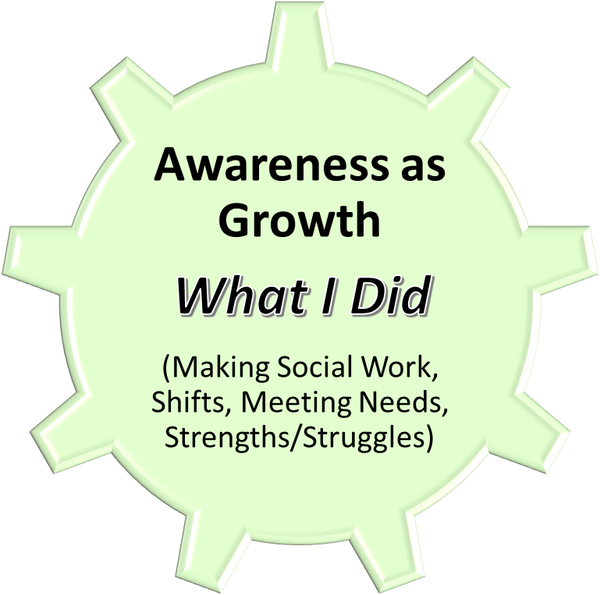
Identity Development (GEAR) Theory
How do we navigate adolescence and adulthood to later identify as seemingly successful, content, or well-transitioned individuals?
As a trauma therapist researching developmental psychology, Bright Insight co-founder and president, Patricia L. Gently, MSMHC, PhD sought to find how twice-exceptional (2e) individuals navigate adolescence to later identify as well-transitioned adults. Dr. Patty knew parents and teachers of gifted and 2e children and adolescents sought success stories about how troubled or worried teens became successful, happy, or simply content. Using a grounded theory research approach, what resulted was a theory of identity development with broader applications than anticipated.
Identity Development (GEAR) Theory, sometimes abbreviated IDT, involves four elements or stages depicted as gears, along with a fifth optional gear.
The gears included elements of
(1) innate/internal experiencing or WHAT JUST IS,
(2) circumstantial experiencing of WHAT HAPPENED,
(3) using awareness as growth to inform WHAT I DID,
(4) radically accepting identity/reality of WHO I AM,
and sometimes (5) using difficulty/experience to inform WHAT I DO.
The full research and summary can be read about here.

“I wanted to look for the good though. Rather than taking a deficit approach to development, I wanted to identify what went right. What made positive developmental outcomes possible?”
- Dr. Patty Gently
Model of Identity Development (Gear) Theory

First Gear: Innate/Internal Experiencing of What Just Is
This first gear displays information about how a person shows up in the world. Based initially on 2e individuals, it may involve any innate quality that exists from birth (think nature). While our awareness of what is innate can grow, it exists whether we see it or not. It JUST IS.
Innate/Internal Experiencing
-
Having an awareness of being different
-
Having natural traits (existential nature & overexcitability)
-
Having natural strengths & abilities:
-
Learning & understanding meaning
-
Intrapersonal & interpersonal awareness
-
Reading/writing/arts
-
Extracurriculars/sports
-
STEM (science, technology, engineering, math)
-
Logical/analytical
-




Second Gear: Circumstantial Experiencing of What Happened
This second gear displays information about what happens to a person as they develop. Purposefully not identified as "good" or "bad" experiences that 2e individuals have, this gear involves any opportunity or challenge (think nurture). While our awareness of what happened can increase and we may or may not appreciate it, it JUST HAPPENED.
Experiencing Opportunity and/or Support
-
Having like peers
-
Having family similarities
-
Being supported by adults and/or professionals
-
Having interests that motivated and/or helped
-
Having the privilege of accommodations
Experiencing Challenges
-
Enduring childhood trauma
-
Experiencing structural inequity
-
Experiencing 2e social struggles
-
Judgment
-
Issues with socializing
-
Lack of social understanding and/or appreciation
-
-
Having difficulty with behaviors and traits related to the 2e experience
Third Gear: Using Awareness as Growth to Inform What I Did
This third gear displays information about what a person does to gain awareness and use it to identify and meet needs. A mini though significant process within the entire identity development process (see below), awareness as growth helps a person consider what just is and what happened (nature and nurture) to inform WHAT THEY DID about it.
Using Awareness as Growth
-
Having an awareness of strengths and struggles
-
Noticing asynchronicity
-
Noticing compensation
-
-
Trying to make one's social world work:
-
Social learning
-
Assessing social dynamics and/or cues
-
-
Experiencing shifts in awareness and/or behavior
-
Divergence from social-cultural structures
-
Developing deeper self-understanding
-
-
Meeting needs
-
Identifying needs
-
Objectively finding what works
-
-
Growing from experience and/or curiosity


Awareness as Growth
(a mini, yet most-significant process in itself)


Fourth Gear: Radically Accepting Identity/Reality of Who I Am
This fourth gear displays the radical acceptance of what just is and what happened after understanding what was done to inform this identity. Most simply, This stage involves accepting nature and nurture along with choices used to inform needs. This gear is identity. This is the reality of WHO I AM.
Radically Accepting Identity/Reality
-
Accepting (having comfort with) difficulty
-
Accepting/embracing difference
-
Identifying with similar peers in adulthood
-
Normalizing
-
Validating
-
Accepting
-
Fifth Gear: Using Difficulty/Experience to Inform What I Do
This fifth gear is one stage not shared by all of the researched adults. That is, while all research participants showed up in the first four gears and developed a clear identity, only most of the adults offered information suggesting involvement in this fifth stage. Those who seemed to experience greater challenges and difficulties used these to inform WHAT THEY DO.
Using Difficulty/Experience
-
Growing from adversity
-
Using passion as advocacy
-
Helping others promotes personal wellness


More About the Research
 |  |  |  |  |
|---|---|---|---|---|
 |  |  |  |  |
 |  |  |

